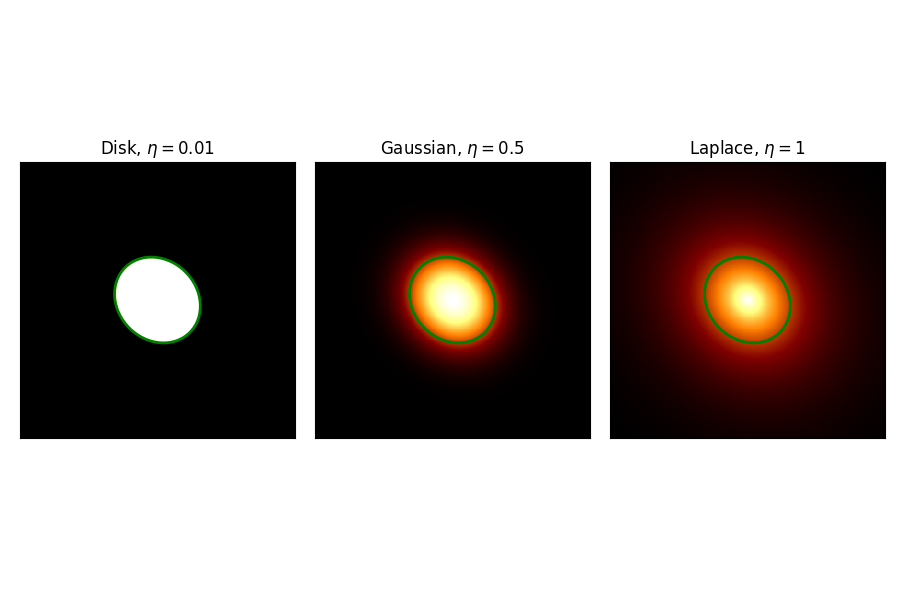Note
Click here to download the full example code or to run this example in your browser via Binder
Generalized gaussian spatial model#
This is a spatial model parametrising a generalized Gaussian function.
By default, the Generalized Gaussian is defined as :
the normalization is expressed as:
where \(\Gamma\) is the gamma function. This analytical norm is approximated so it may not integrate to unity in extreme cases if ellipticity tend to one and radius is large or \(\eta\) much larger than one (outside the default range).
The effective radius is given by:
where \(r_M\) (\(r_m\)) is the major (minor) semiaxis, and
\(\Delta \phi\) is the difference between phi, the position angle of the model, and the
position angle of the evaluation point.
If the eccentricity (\(e\)) is null it reduces to \(r_0\).
Example plot#
Here is an example plot of the model for different shape parameter:
from astropy import units as u
import matplotlib.pyplot as plt
from gammapy.maps import Map, WcsGeom
from gammapy.modeling.models import (
GeneralizedGaussianSpatialModel,
Models,
PowerLawSpectralModel,
SkyModel,
)
lon_0 = 20
lat_0 = 0
reval = 3
dr = 0.02
geom = WcsGeom.create(
skydir=(lon_0, lat_0),
binsz=dr,
width=(2 * reval, 2 * reval),
frame="galactic",
)
tags = [r"Disk, $\eta=0.01$", r"Gaussian, $\eta=0.5$", r"Laplace, $\eta=1$"]
eta_range = [0.01, 0.5, 1]
r_0 = 1
e = 0.5
phi = 45 * u.deg
fig, axes = plt.subplots(1, 3, figsize=(9, 6))
for ax, eta, tag in zip(axes, eta_range, tags):
model = GeneralizedGaussianSpatialModel(
lon_0=lon_0 * u.deg,
lat_0=lat_0 * u.deg,
eta=eta,
r_0=r_0 * u.deg,
e=e,
phi=phi,
frame="galactic",
)
meval = model.evaluate_geom(geom)
Map.from_geom(geom=geom, data=meval.value, unit=meval.unit).plot(ax=ax)
pixreg = model.to_region().to_pixel(geom.wcs)
pixreg.plot(ax=ax, edgecolor="g", facecolor="none", lw=2)
ax.set_title(tag)
ax.set_xticks([])
ax.set_yticks([])
plt.tight_layout()

YAML representation#
Here is an example YAML file using the model:
pwl = PowerLawSpectralModel()
gengauss = GeneralizedGaussianSpatialModel()
model = SkyModel(spectral_model=pwl, spatial_model=gengauss, name="pwl-gengauss-model")
models = Models([model])
print(models.to_yaml())
components:
- name: pwl-gengauss-model
type: SkyModel
spectral:
type: PowerLawSpectralModel
parameters:
- name: index
value: 2.0
- name: amplitude
value: 1.0e-12
unit: cm-2 s-1 TeV-1
- name: reference
value: 1.0
unit: TeV
spatial:
type: GeneralizedGaussianSpatialModel
frame: icrs
parameters:
- name: lon_0
value: 0.0
unit: deg
- name: lat_0
value: 0.0
unit: deg
- name: r_0
value: 1.0
unit: deg
- name: eta
value: 0.5
- name: e
value: 0.0
- name: phi
value: 0.0
unit: deg